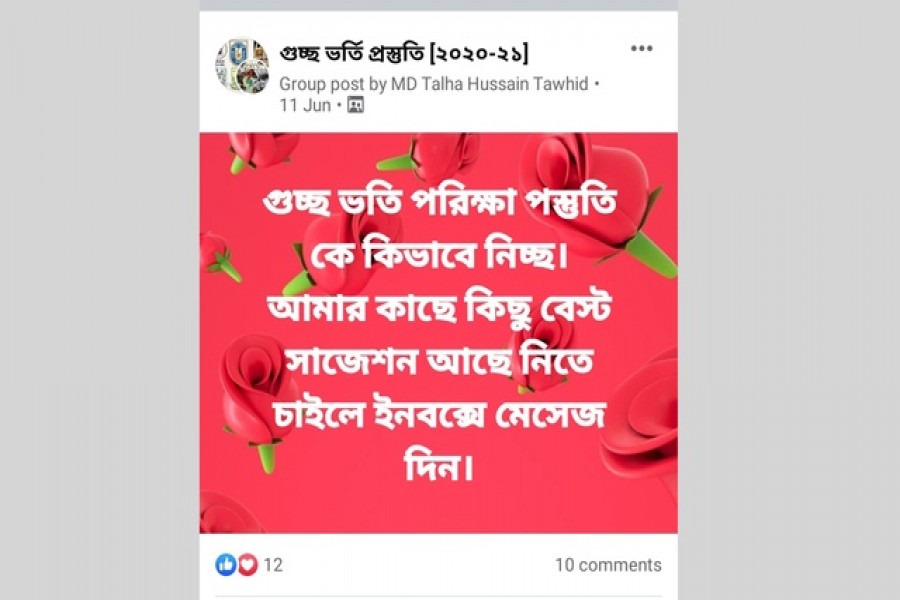Cluster exams: Authorities urge caution as Facebook abounds with ‘leaked question papers’

Published :
Updated :

With the cluster admission test to public universities on the horizon, Facebook is littered with dubious pages offering to sell 'leaked question papers'.
And, some unsuspecting students are even falling into the trap of buying these so-called leaked papers to make the grade in the upcoming test.
However, the authorities have assured that there is “no way the questions can be leaked”,
Taijul Hasan, a university admission seeker, is one of the students who was duped into paying for the question papers on social media.
“I, along with another, paid Tk 10,000 for the leaked questions. When I heard they blocked the other person, I contacted them about it and then they blocked me as well. I ended up with no question papers and lost money as well,” Taijul said.
“We urge the examination committee to punish those who are involved in this. Many of us are being fooled in such a manner.”
When the issue was brought to his attention, Dr Munaj Ahmed Noor, convener of the technical sub-committee on the cluster admission test, said, “The test will be held following the higher secondary syllabus and nothing from outside that. We will let the law enforcement know if anyone makes a complaint.”
For the first time, the tests for admission into 20 universities will be held in clusters on Oct 17, with the students appearing in person.
The test will be held in three separate clusters for humanities, commerce and science and the students will answer multiple-choice questions worth 100 marks.
Based on the results, the universities will enrol students on their own terms. The test for the science division will be held on Sunday.
Facebook posts about suggestions and question papers emerged right before the tests set off.
Several such posts have lured students by asking them to contact the 'sellers' through Messenger to get the leaked questions on the eve of the exam.
Experts urged the authorities to identify the culprits and swiftly deliver justice to prevent such misdeeds.
AAMS Arefin Siddique, a former Dhaka University vice-chancellor, said, “Enrolling into universities carries great stakes for the boys and girls. They look to cut corners even after preparing for the tests.”
“In the end, those who promise admission and provide question papers fail to do so. And even if they can, their methods spoil the students’ future.”
Arefin feels it is important to educate students on honesty and ethics from the elementary level.
Calling on everybody to pay attention to moral values, he said, “We could not educate the parents on this either. They, too, look to pay [for childrens’ university enrollment] during admission seasons.”
“Authorities must immediately remove such posts and swiftly identify the source to deliver exemplary punishment. The steps against those who are trapping the boys and girls of this generation need to be more exacting than the actions authorities are taking against wrongdoings on mass media or social media through the Digital Security Act.”
“These fraudsters are causing great harm to acquire some money. We need to give the matter a lot of thought.”
TEMPTATION, CURIOSITY AND BLOCKS
Nowshin Tabassum is seeking admission into the science division through the cluster test.
According to her, once a student follows instructions and messages the authors of the posts personally for the leaked questions, they are asked to make a payment.
“We’ve finished preparing for the exams, so everybody considers the leaked question offers. They reject proposals of paying up after the tests. One of them demanding Tk 30,000 asked for half of the money in advance. I was flooded with messages when I stopped replying.”
“When I said I’ll be able to pay Tk 5,000 in advance, I had to provide a photo of my admit card and then I was asked for 50 percent advance payment again. I was blocked from the page when I did not make the payment.”
A Facebook group claims to provide information and admission support for cluster tests. A reply from one Robin Hasan’s profile said questions for the humanities division would be provided through WhatsApp the night before the examination for payment of Tk 30,000. However, Tk 5,000 must be paid upfront.
When asked about how they acquired the question papers, the person behind the account said, “What I do or how I get the questions does not matter. I’m able to provide the questions because I’ve got links to where they can be acquired. I bring them directly and have done so before.”
Tahsin Abraham Rosen, a fake account claiming to provide leaked questions, asked for Tk 40,000, half of it in advance, for questions of Unit A.
Asked where he got the questions from, he simply said, “Our administrators provide it.” He claimed these 'administrators' were from universities, but did not reveal their positions when asked.
A screenshot of a WhatsApp group conversation over leaking Dhaka University Unit A questions went viral on social media on the night before the test. But university authorities dismissed it as rumours and promised to take action against those who spread it.
The cluster test for the humanities division will be held on Oct 24, while the commerce unit examination is scheduled for Nov 1.
As many as 361,406 students applied for admission to the universities included in the cluster.
Among them, 194,841 are seeking enrolment into the science division, 107,933 into humanities and 58,632 into commerce.


 For all latest news, follow The Financial Express Google News channel.
For all latest news, follow The Financial Express Google News channel.